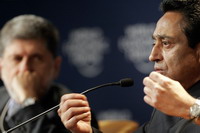America shows irrational position in struggling global trade talks
Brazil calls U.S. position in struggling global trade talks"irrational", when a day before Washington said a liberalization pact was in peril because developing countries were refusing to open up their manufacturing markets.

The United States has been seeking to divert attention away from its unwillingness to accept significant cuts in farm subsidies, six years into the World Trade Organization talks, said Roberto Azevedo, the Brazilian Foreign Ministry's top trade official.
Efforts to liberalize manufacturing trade have hit a rough patch less than a month after the U.S. breathed new life into the WTO's Doha round of trade talks, by agreeing to limit trade-distorting farm subsidies to a range between US$13 billion (9.2 billion EUR) and US$16.4 billion (11.6 billion EUR).
The round aims to add billions of dollars (euros) to the world economy and lift millions of people out of poverty through free trade. But it has repeatedly stalled since its inception in Qatar's capital in 2001, largely because of wrangling between rich and poor nations over eliminating farm subsidies, more recently, barriers to manufacturing trade.
On Tuesday, the U.S. slammed Brazil, India, South Africa and others after a meeting of the WTO's general council, where they proposed new exceptions for the industrial products that make up the vast majority of goods traded internationally.
"It is unfair, unreasonable and irrational," Azevedo told reporters.
Echoing the view of many of 151-member WTO's developing nations, he said major industrial concessions could not be made as long as the U.S. was holding out on agriculture, which has long been considered the focus of the round.
Washington, he claimed, was threatening the world's poorer countries with a "take it or leave it" ultimatum on eliminating protection for their fledgling industries.
Part of the reason the Doha round has sparked such fierce and prolonged debates is that the final treaty must be agreed by consensus and will be legally binding on all countries. The new WTO proposals, by the industrial talks chair Don Stephenson and chief farm trade negotiator Crawford Falconer, were released in July in an attempt to force countries into bargaining.
The United States has been under considerable pressure to limit payments to American farmers of major crops such as corn, cotton, rice, soybean and wheat. Critics of the subsidies say they drive down prices, making it impossible for small farms to compete in international markets and more difficult for poorer countries to develop their economies by selling agricultural produce abroad.
While Washington's move last month has shifted some of the pressure to emerging economic powers. But Azevedo said the U.S. move was "ambiguous" and that the world's richest nation need to do more.
He cited the example of cotton, for which the U.S. has rejected outright a call for an 82 percent cut in trade-distorting handouts, without even making a counterproposal. For the most egregious subsidies to American producers of corn, rice, soybean and wheat, the U.S. is demanding subsidy limits up to 38 percent higher than what was entailed in the WTO draft deal, he said.
Azevedo also criticized the 27-nation European Union for trying to find new ways to shield its most sensitive farm sectors from foreign competition, by "giving with hand and taking away with the other."
The EU on Tuesday also criticized prominent developing countries for avoiding a "reasonable" compromise on industrial goods at an important juncture in the Doha round
Sean Spicer, spokesman for U.S. Trade Representative Susan Schwab, said of Brazil and the others: "This is a gigantic step backward. Are they trying to find a successful outcome or are they trying to light a fuse to blow up this round?"
Subscribe to Pravda.Ru Telegram channel, Facebook, RSS!



